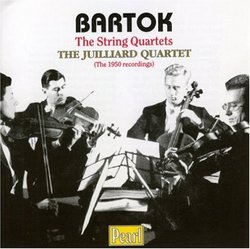Juilliard's Masterly Bartok
Jeffrey Lipscomb | Sacramento, CA United States | 04/12/2005
(5 out of 5 stars)
"Congratulations to Pearl for this seminal Bartok set, and to Edith Eisler for her illuminating Amazon editorial review. I heard the Juilliard perform the 3rd Quartet at Jordan Hall (Boston) in 1971, and it was simply spellbinding. The players at that time were comprised of Robert Mann & Earl Carlyss (violins), Samuel Rhodes (viola) and Claus Adam on cello. This pioneering 1950 set from Pearl has the Juilliard's original personnel (Mann and Robert Koff, with violist Raphael Hillyer and cellist Arthur Winograd), while their 1963 stereo recording featured Mann and Isidore Cohen (violins) with Hillyer and Adam. There was also a 1981 set, but it was a sadly-anemic shadow of these earlier recordings. The 1963 version was briefly available on CD as a Sony import - it is urgently in need of re-issue.
In the notes that came with my 1963 Columbia LPs (I missed out on the Sony CD), author James Goodfriend observes that " ... The mystique of the string quartet is twofold. In the first place, it must be classically controlled and balanced. In the second, it must express the composer's inmost feelings. The relation between a quartet and a symphony, for example, is much like that of poetry and prose: they may each say similar things, but the former must say it with fewer words and with greater restrictions. The great quartet writers of the past were Haydn, Mozart, Beethoven and Schubert (significantly, none of the later romantics can be cited), and in our own century, the six Bartok quartets form quite possibly the only set worthy to stand in such company." I agree. And perhaps terse and verse rhyme for a reason.
While there are many worthy competitors here, such as the proficient but emotionally-reserved Emerson Quartet and the more rustic-sounding Takacs, for me the Juilliard plumbs the inner fire of these works like no other ensemble. In 1950 they play with greater repose (slower and more meditative), while in 1963 their cat-like agility and dynamic precision are without parallel. Both sets are essential listening.
Works of burning joy and lonely desolation,
Quartets mirror all of Bartok's obsessions,
The Juilliard's way is profound revelation,
Let it be one of your prized possessions.
Jeff Lipscomb
"
Invaluable performances!
Hiram Gomez Pardo | Valencia, Venezuela | 11/23/2005
(5 out of 5 stars)
"The artistic commitment of Bela Bartok is absolutely extraordinary. His architectural sense, his deep concerns about the man and the cosmos has been never best expressed but through his Quartets Cycle. There is certain superficiality when it is affirmed he is an atonal composer. That statement is apparent; his inspiration arises from a fantastic melting of Hungarian folk music, but also a cosmic gaze. There is fullness and grandness extremely hard to put in words context. In this sense his concerns are very similar respect Bruckner; that is why the outer space inspiration certainly, does not reveal human motives and a total breakthrough with the ancient musical forms.
If you want to get close to Bartok 's world, please acquire this invaluable set, that remains just two echelons bellow both versions of Vegh Quartet; the most recent version of the Paris cycle in 1954 (My first choice, by far, from Music and Arts) and the other (Auvidis).
"


 Track Listings (10) - Disc #1
Track Listings (10) - Disc #1